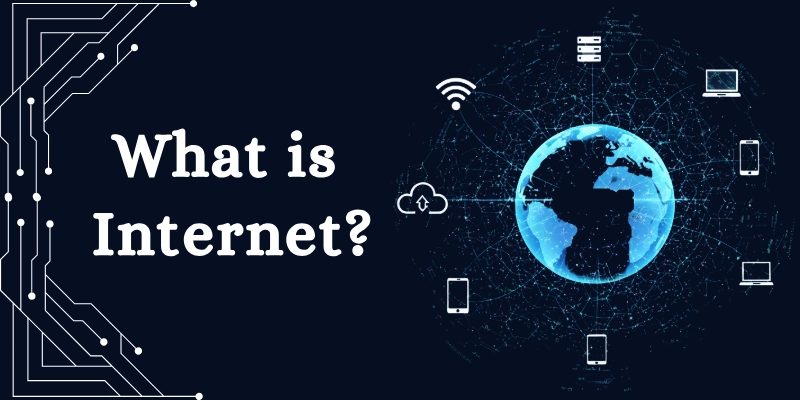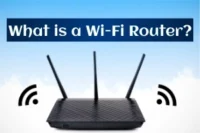What is Internet: A Simple Guide for Beginners in 2026
Published: 21 Sep 2025
Can u imagine life without Google, WhatsApp, or YouTube? No quick answers, no chatting with friends far away, and no watching videos anytime. Life would be hard! All these are possible because of the internet.
Simply put, the internet is a global network that connects computers, phones, and other devices so people can share information, learn, and communicate easily. It is important for education, business, entertainment, and staying in touch with others.

In this article, you will learn what the internet is, its internet meaning, history, types, how it works, uses, benefits, problems, safety tips, and more. This guide is perfect for internet for beginners who want to understand the internet clearly.
What is the Internet?
The internet definition is simple: it is like a giant library where anyone can read, watch, or share information from anywhere in the world. It connects people, devices, and information so everyone can learn, communicate, and explore easily.
Key Features of the Internet
The internet for beginners has some important features:
- Global network: Connects computers and devices all over the world.
- Accessible 24/7: You can use it anytime, day or night.
- Connects devices: Phones, computers, tablets, and smart devices can all join.
- Supports different content: You can find text, videos, images, and more.
History of the Internet
Understanding the history of the internet helps beginners see how it grew over time:
- 1960s – Early Beginnings: ARPANET, the first network, connected a few computers for research.
- 1970s–1980s – Development: TCP/IP protocols were created to allow networks to communicate.
- 1990s – Public Use: The Internet became available for businesses and people worldwide.
- 2000s–Present – Modern Internet: Fast broadband, mobile internet, and cloud services make the internet faster and more accessible than ever.
How Does the Internet Work?
Understanding how the internet works can be simple. Imagine the internet as a road system. Each house is a computer, and letters are pieces of data. When you send or receive information, it travels along these roads to reach the right house.
Computers (clients) request data from servers, which store websites, videos, or files. The servers send the data back to your device so you can see it instantly.
Internet Connection Types
There are different internet connection types for beginners:
- Broadband: Fast and widely used in homes.
- Dial-up: Old and very slow, rarely used now.
- Fiber-optic: Super fast and modern.
- Mobile data: 4G and 5G let you use the internet on phones.
- Satellite internet: Works in remote areas without cables.
Internet Protocols
Internet protocols are rules that help devices communicate:
- IP Address: Like your home address, it identifies your device.
- HTTP/HTTPS: Rules for sending websites safely to your browser.
- DNS: Translates website names into IP addresses so computers can find them.
Real-Life Example
Imagine sending an email or watching a video:
- Your device sends a request.
- The server receives it.
- The server sends the data back.
- Your device displays it instantly.
This simple process happens in seconds every time you browse, stream, or message online.
Types of Internet
There are several types of internet that people use depending on speed, location, and device.
- Dial-Up:
Dial-up is the oldest type of internet. It uses telephone lines and is very slow compared to modern connections. Most people do not use it today. - Broadband:
Broadband is the most common internet connection type. It uses cable or DSL lines and is much faster than dial-up. Homes and offices mostly use broadband for everyday internet activities. - Fiber-Optic:
Fiber-optic internet uses light signals to send data. It is extremely fast and perfect for HD streaming, online gaming, and large downloads. It is one of the best modern connections. - Mobile Internet:
Mobile internet works through 4G and 5G networks. It is available on smartphones, tablets, and some laptops, making it easy to access the internet anywhere. - Satellite Internet:
Satellite internet works in remote areas where cables cannot reach. It depends on signals from satellites and is slightly slower than broadband or fiber-optic, but it connects even the most distant places.
Uses of the Internet
The use of the internet is everywhere in our daily lives. It helps people learn, communicate, shop, and have fun.
- Communication:
The internet makes communication easy. You can send emails, make video calls, or chat using messaging apps. For example, you can talk to friends on WhatsApp even if they live in another country. - Education:
The internet is very helpful for learning. Students can take online courses, watch tutorials, and do research. Websites like Khan Academy or YouTube tutorials make learning simple and fun. This is why the internet for education is so important. - Entertainment:
The internet provides endless entertainment. You can stream videos, listen to music, or play online games. Popular platforms include YouTube, Netflix, and Spotify. - Shopping:
Online shopping is easy with the internet. You can buy products from stores like Amazon or Flipkart and pay digitally using services like PayPal. - Information:
The internet gives quick access to news, blogs, tutorials, and even government services. You can find almost any information within seconds.
The benefits of the internet make life faster, easier, and more connected than ever before.
Advantages and Disadvantages of the Internet
The internet has many benefits that make life easier, faster, and more connected, but it also comes with some risks that users should be careful about. Understanding the advantages and disadvantages of the internet helps beginners use it safely and smartly.
| Advantages of the Internet | Examples | Disadvantages of the Internet | Examples / Risks |
| Fast Communication | Chat or video call on WhatsApp instantly | Privacy Issues | Sharing personal info online can be risky |
| Learning Opportunities | Online courses on Khan Academy | Cybercrime | Hacking or phishing attacks |
| Online Business & Work | Sell products on Amazon or work remotely | Addiction | Spending too much time on social media or games |
| Entertainment & Media | Watch Netflix, YouTube, listen to Spotify | Misinformation | Fake news or online scams |
| Global Connectivity | Collaborate with friends worldwide | Health Problems | Eye strain, poor posture from long screen time |
Internet Safety Tips
Using the internet is fun and helpful, but it is important to stay safe. These internet safety tips will help you use the internet wisely and protect yourself online.
- Passwords:
Create unique and strong passwords for your accounts. Avoid using easy passwords like “12345” or your name. For example, a mix of letters, numbers, and symbols keeps your email and social media accounts safe. - Suspicious Links:
Never click on unknown or suspicious links in emails, messages, or websites. These links can lead to viruses or scams. For example, a fake link might try to steal your bank details. - Antivirus & Firewall:
Install antivirus software and enable your firewall to protect your devices. This stops viruses, malware, and hackers from damaging your computer or phone. - Screen Time:
Spend a healthy amount of time online to avoid eye strain, headaches, or poor posture. For instance, take breaks after every hour of browsing or gaming. - Personal Information:
Do not share too much personal information on social media or websites. Avoid posting your phone number, address, or passwords online to stay safe.
Following these safe internet use tips ensures that you enjoy the internet while staying protected from risks.
Conclusion
The internet is a global network that connects devices. It helps in communication, learning, entertainment, shopping, and work. The advantages of the internet include fast communication, learning, online work, entertainment, and global connections.
The disadvantages of the internet are privacy risks, cybercrime, addiction, misinformation, and health issues. By following internet safety tips, like using strong passwords and protecting personal information, you can stay safe online.
Now that you know what the internet is, you can enjoy its benefits safely.
FAQs
Have questions about the internet? Here are the answers in a simple way for beginners.
Internet service is a system that provides access to the internet through a network connection. It allows devices like computers, phones, and tablets to browse websites, send emails, stream videos, and communicate online.
Internet upload speed is the rate at which data is sent from your device to the internet. It affects how fast you can send emails, upload files, or share videos online.
Internet safety means using the internet in a way that protects your personal information and devices. It includes avoiding suspicious links, using strong passwords, and not sharing private data online.
Internet security is the practice of protecting your devices, data, and online activities from cyber threats. It includes using antivirus software, firewalls, and safe browsing habits to prevent hacking or data theft.
Internet history is the story of how the Internet was created and developed over time. It began with ARPANET in the 1960s and grew through TCP/IP protocols, public use in the 1990s, and modern broadband and mobile networks today.
Internet Air is a wireless connection that delivers the internet through radio signals. At the same time, Fiber is a wired connection that uses optical cables to send data at very high speeds and with high reliability. Fiber internet is generally faster and more stable, whereas Internet Air is easier to access in areas without cables.

- Be Respectful
- Stay Relevant
- Stay Positive
- True Feedback
- Encourage Discussion
- Avoid Spamming
- No Fake News
- Don't Copy-Paste
- No Personal Attacks

- Be Respectful
- Stay Relevant
- Stay Positive
- True Feedback
- Encourage Discussion
- Avoid Spamming
- No Fake News
- Don't Copy-Paste
- No Personal Attacks





